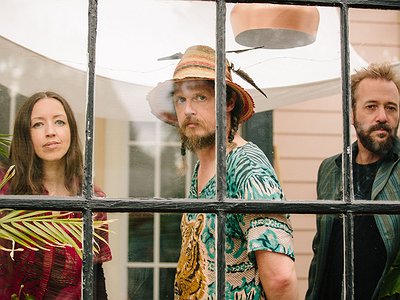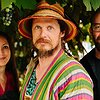Part 2
Take us through a day in your life, from a possible morning routine through to your work, please. Do you have a fixed schedule? How do music and other aspects of your life feed back into each other - do you separate them or instead try to make them blend seamlessly?
Every day is really different. I drink the hot yerba mate tea, I step outside into the fresh air and feed the crows. Sometimes I walk, sometimes I drive a car. If I drive a car, I sing very loudly and practice all of the overtones in my voice. I mostly stay around D and C sharp because so many interesting things start to happen in the nuanced spaces between the microtonal intervals, there is enough to explore there for many hours. The overtones do all the work. I’m always looking for mushrooms if there is moisture on the ground.
Can you talk about a breakthrough work, event or performance in your career? Why does it feel special to you? When, why and how did you start working on it, what were some of the motivations and ideas behind it?
My relationship with the “Jathilan” trance music of East Java came about quite organically. I heard it on a cassette tape, so I taught myself Indonesian and went to Java and started finding the musicians who recorded that cassette tape and started playing with them. The music really only exists with dance, and the dance takes place within a ritual space of initiation and purification. We don’t have anything like it in Western culture but some aspects reminded me of punk rock shows of my teenage years, some aspects like the best kind of free jazz, some things are similar to the psychedelic mushroom state of awareness, but all the power of the ritual comes directly from the contact with spirits.
So being able to join with musicians in this context is so important to me. I don’t steal anything, I don’t try to recreate things I hear in different places, I just find ways to translate an experience that can’t be explained. It doesn’t matter what the music “sounds like” if you are using music to talk to spirits because the spirits will understand if your intention is pure or not.
There are many descriptions of the ideal state of mind for being creative. What is it like for you? What supports this ideal state of mind and what are distractions? Are there strategies to enter into this state more easily?
Many secrets yes. Trust the drum, trust repetition to get you into a freer state, then you can do anything you want.
Music and sounds can heal, but they can also hurt. Do you personally have experiences with either or both of these? Where do you personally see the biggest need and potential for music as a tool for healing?
The biggest problem is there is an industry of new age “sound healing” and it’s 99% total bullshit. Sound actually DOES heal, but if you’re just doing some YouTube meditation with little bells or something you aren’t experiencing it. Most music that has a power to heal is NOT relaxing music at all. Healing music tends to be more confrontational, it activates, not makes you fall asleep. Most people don’t want to be healed, they just want to sleep.
There is a fine line between cultural exchange and appropriation. What are your thoughts on the limits of copying, using cultural signs and symbols and the cultural/social/gender specificity of art?
The conversations we have about these “issues” now in 2021 is completely different than the conversations we will be having by 2045. All of these questions of cultural specificity become completely irrelevant in the face of total ecological destruction and the complete domination of capitalist-fuelled Artificial Intelligence surveillance technologies. Humans are very close to extinction, so differences we now experience between different cultures or genders etc will mean absolutely nothing to the survivors. It is essential to resist algorithm-fuelled forced homogenization by any and all means necessary.
Our sense of hearing shares intriguing connections to other senses. From your experience, what are some of the most inspiring overlaps between different senses - and what do they tell us about the way our senses work?
Yes, hearing and vision are very close. Touch, smell and taste are more “primitive” parts of the brain so there is a lot more territory to explore if we take it all in as a whole. There are certain kinds of music in Indonesia that really make so much more sense if you smell a “kretek” clove cigarette burning next to a little fried chicken in spicy rice. So, if we want to create more immersive experiences for people these are good things to consider- if your venue has a certain special smell, or maybe some kind of food that is only available for a particular kind of concert. For me, the touch is always a big part of a concert because you have to cultivate such a strong physical relationship with any instrument, even your microphone must become a cybernetic appendage of your body.
Art can be a purpose in its own right, but it can also directly feed back into everyday life, take on a social and political role and lead to more engagement. Can you describe your approach to art and being an artist?
If it doesn’t bring you joy, why are you doing it? If you don’t love what you are doing, there is no reason to do it. Do something else before you die. Art shows you a pathway, how you find “something else” when finding “something else” seems absolutely impossible. Not everyone will understand, but art MUST always be in close reach of anyone who is desperate to find it.
What can music express about life and death which other forms of art may not?
The way the brain “maps” consciousness uses a musical syntax- so when we are able to truly experience music we are creating maps in our mind that glue together a multitude of life experiences into an undifferentiated totality of all the things we can potentially feel in a lifetime. I’m sure you can do the same thing with a painting, but most people don’t spend enough time with paintings to have that experience.






